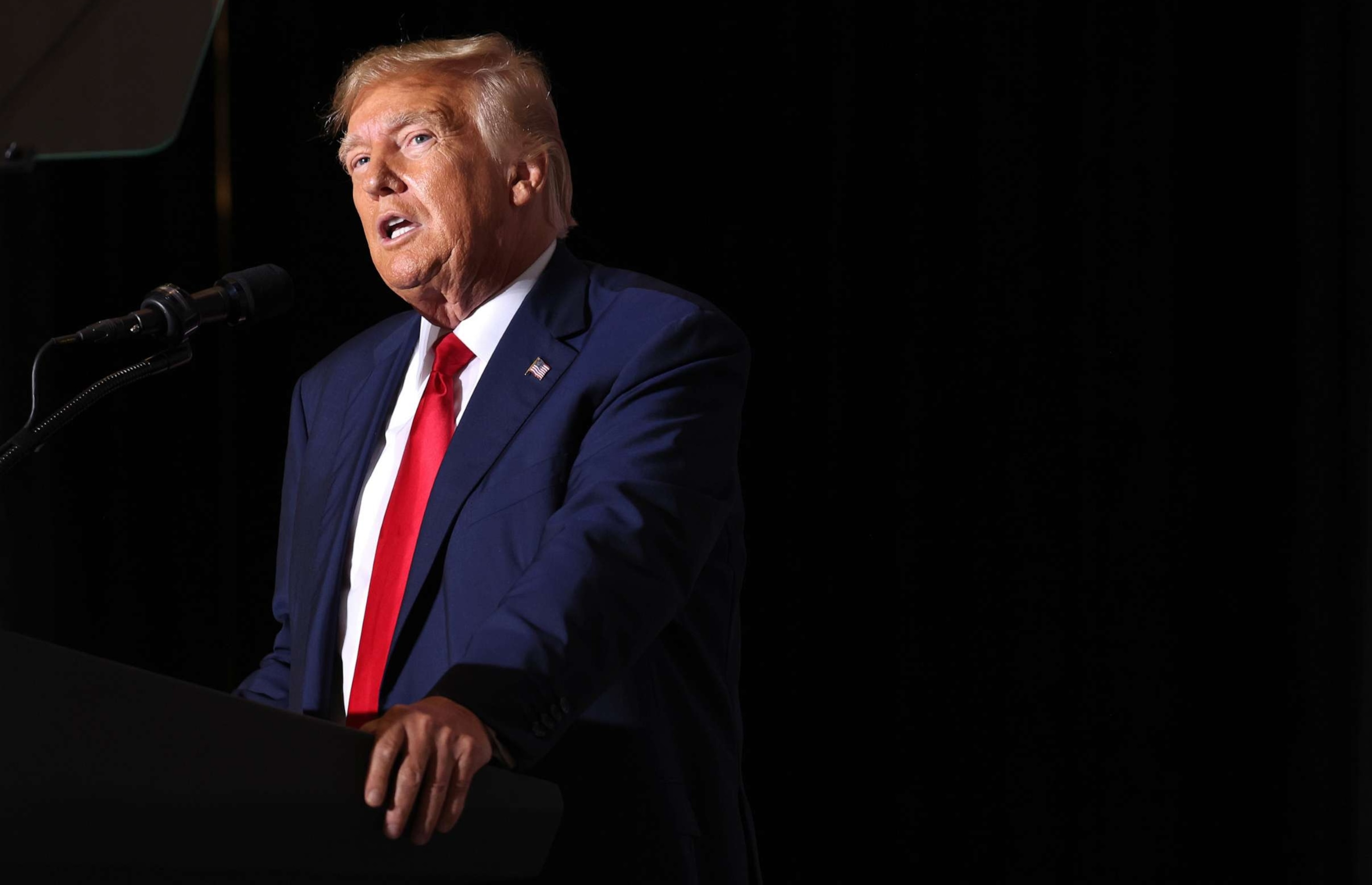华盛顿特区的一家上诉法院向特别顾问办公室的检察官和唐纳德·特朗普的律师施压,要求他们考虑特朗普有限禁言令的可行性联邦选举干预案在周一的听证会上。
这有限禁言令由美国地区法官塔尼亚·楚特坎(Tanya Chutkan)发布,但目前在上诉中暂停,禁止特朗普发表或转发“公开针对”特别顾问杰克·史密斯及其工作人员的声明,以及针对法官的工作人员和华盛顿特区地区法院其他人员的声明。
法官们没有立即就是否应该恢复限制言论自由的命令做出决定。

2023年7月7日,在爱荷华州康瑟尔布拉夫斯的中美中心举行的农民支持特朗普活动中,前总统唐纳德·特朗普向支持者发表讲话。
斯科特·奥尔森/盖蒂图片社
8月的特朗普不服罪被控通过招募一系列所谓的“假选举人”,利用司法部进行“虚假选举犯罪调查”,试图招募副总统“改变选举结果”,并在1月6日暴乱肆虐时宣传虚假的选举舞弊指控,以推翻2020年选举的结果——所有这些都是为了颠覆民主,继续掌权。
这位前总统否认所有不当行为,并谴责这些指控是“对政治对手的迫害”。
在特朗普发表评论和在线帖子,包括称史密斯为“精神错乱”和“暴徒”后,楚特坎上个月发布了有限的禁言令。
在周一的听证会上,特朗普的律师约翰·绍尔(John Sauer)称,针对特朗普的有限禁言令是“前所未有的”,为“未来限制核心政治言论树立了一个可怕的先例”。
绍尔说:“在政治竞选的背景下,政府的角色不是决定什么是——什么话题是合适的或不必要的。”。"禁言令做到了这两点."
法官小组问绍尔,如果一年前对特朗普实施禁言令,他的立场是否会有所不同——寻求澄清临近2024年总统大选是否会影响他们对禁言令合宪性的立场。
绍尔表示,他仍然认为禁言令违宪,特朗普对史密斯和该案的批评符合受保护的政治言论。
一名法官随后问辩方的立场是否是特朗普“凌驾于法律之上”,绍尔回答说,他们没有争辩这一点。
法官接着问绍尔,他是否认为法院在任何时候都可以声称对保护审判的完整性有足够的兴趣,以至于可以实施这样的禁言令,并向他提供了最高法院的几个先例。
然而,绍尔指出,目前的情况代表了一种完全独特的情况。
绍尔还认为,要实施禁言令,威胁必须是“迫在眉睫”的,而不仅仅是猜测——布拉德利·加西亚法官指出这与先例相冲突。
特别顾问上诉律师塞西尔·范德维德(Cecil VanDevender)辩称,最高法院先例支持对史密斯进行直接攻击的限制,但法官要求他解释为什么这没有侵犯特朗普的第一修正案权利,提出了一个假设的场景,即特朗普正处于辩论阶段,他的对手可以就他面临的起诉提出各种具体问题,并询问他是否应该被禁止回应这些问题。
法官问VanDevender,当舞台上的每个人都瞄准他时,特朗普是否必须说“礼貌女士”。
VanDevender表示,现有的命令将允许特朗普说起诉是出于政治动机,并称司法部腐败,但特朗普甚至应该被禁止提及该案中检察官的名字——这一立场导致法官的强烈反对,因为他们向他提出了几个假设的场景,可以测试禁言令。
一名法官问特朗普是否可以回应比尔·巴尔1月6日在《60分钟》节目中对他的攻击,称巴尔所说的一切都是假的。
VanDevender建议特朗普可以说这是假的,但不能使用其他“煽动性语言”或以影响陪审团的方式直接攻击巴尔的可信度。
另一名法官要求称某人为煽动性的“卑鄙的骗子”。
“我认为这是煽动性的,”范德维德回答说,并补充说,虽然特朗普可以说他“不同意”一名证人与1月6日有关的证词,但他不能说他们“撒谎了”。
“我们当然希望确保刑事审判过程及其完整性和真相调查功能得到保护,”一名法官在谈到该小组将做出决定的过程时说。
Appeals court, after hearing arguments, will mull limited gag order in Trump's federal election interference case
A Washington, D.C., appeals court pressed prosecutors with the special counsel's office and attorneys for Donald Trump over the viability of a limited gag order in Trump'sfederal election interference caseat a hearing Monday.
Thelimited gag order, issued by U.S. District Judge Tanya Chutkan but currently paused on appeal, prohibits Trump from making or reposting statements "publicly targeting" special counsel Jack Smith and his staff, as well as targeting the judge's staff and the staff of other D.C. district court personnel.
The judges did not immediately issue a decision on whether the limited gag order should be reinstated.
Trump in Augustpleaded not guiltyto charges of undertaking a "criminal scheme" to overturn the results of the 2020 election by enlisting a slate of so-called "fake electors," using the Justice Department to conduct "sham election crime investigations," trying to enlist the vice president to "alter the election results," and promoting false claims of a stolen election as the Jan. 6 riot raged -- all in an effort to subvert democracy and remain in power.
The former president has denied all wrongdoing and denounced the charges as "a persecution of a political opponent."
Chutkan issued the limited gag order last month after Trump made comments and online posts that included calling Smith "deranged" and a "thug."
At Monday's hearing, Trump attorney John Sauer described the limited gag order against Trump as "unprecedented" and one that set "a terrible precedent for future restrictions on core political speech."
"It's not the role of the government to dictate what is -- what topics are appropriate or unnecessary to discuss in the context of a political campaign," Sauer said. "The gag order does both of those things."
The panel of judges asked Sauer if his position would be different if the gag order was implemented against Trump a year ago -- seeking clarity on whether the proximity to the 2024 presidential election would impact their stance on the gag order's constitutionality.
Sauer said he would still consider the gag order unconstitutional and that what Trump is engaging in with his criticisms of Smith and the case qualifies as protected political speech.
A judge then asked whether the defense's position is that Trump is "above the law," to which Sauer replied they haven't argued that.
The judge then pressed Sauer on whether he believes courts, at any point, can claim a sufficient interest in protecting the integrity of a trial that they could implement such a gag order -- and presented him with several instances of Supreme Court precedent.
Sauer, however, agued that the present conditions represent a wholly unique situation.
Sauer also argued that for a gag order to be put in place, a threat has to be "imminent" and not merely speculative -- which Judge Bradley Garcia indicated ran afoul of precedent.
Special counsel appellate attorney Cecil VanDevender argued that restrictions on making direct attacks against Smith were supported by Supreme Court precedent -- but judges challenged him to explain why that didn't violate Trump's First Amendment rights, raising a hypothetical scenario in which Trump is on a debate stage where his opponents can raise all manner of specific issues regarding the prosecutions he is facing, and asking whether he should be barred from responding to them.
The judge asked VanDevender whether Trump would have to speak "Ms. Manners" while everyone on the stage is targeting him.
VanDevender said the existing order would permit Trump to say the prosecution was politically motivated and call the Justice Department corrupt, but that Trump should be barred from even mentioning the names of prosecutors in the case -- a position that resulted in aggressive pushback from judges as they presented him with several hypothetical scenarios that could test the gag order.
One judge asked if Trump could respond to a Bill Barr appearance on 60 Minutes attacking him over Jan. 6, by saying everything Barr said was false.
VanDevender suggested Trump could say it was false, but couldn't engage in other "inflammatory language" or attack Barr's credibility directly in a way that would influence the jury pool.
Another judge asked it calling someone a "slimy liar" inflammatory.
"I think it's inflammatory," VanDevender answered -- adding that while Trump could say he "disagreed" with a witness' testimony related to Jan. 6, he could not say that they "lied."
"We certainly want to make sure that the criminal trial process and its integrity and truth-finding function are protected," a judge said of the process by which the panel will makes its decision.





